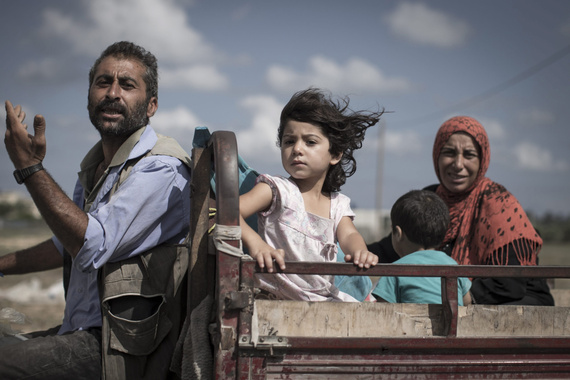Many times during an armed conflict, it takes a catastrophic event to get everyone's attention. Bloodshed can produce more bloodshed and retribution, but if seized properly, it can also increase the pressure on the international community to take a second look at a sustainable and effective plan for deescalation.
On August 21, 2013, hundreds of millions of people around the world witnessed one of the most horrific crimes yet in the 21st Century: the gassing of 1,400 Syrian civilians on the outskirts of Damascus. The event was so horrifying and grotesque that the U.N. Security Council, divided for over two years on the Syrian civil war, was able to put aside some serious differences to reach a binding understanding on the destruction of Syria's chemical arsenal. The chemical weapons assault in the dead of night was so traumatizing and visible to people the world over -- television screens and front pages ran pictures of small children, including infants, lying motionless on the floor -- that one of the planet's most ruthless regimes was forced to willingly give up its arsenal of chemical arms. A major concession by the Assad regime was needed in order to avert military retaliation.
After two weeks of fighting between Israeli soldiers and Palestinian militants in the Gaza Strip, the latest round of Israel-Hamas violence may have hit a similar groundbreaking event on Sunday, July 20: a day when the casualties were so high that it may compel all sides in the fighting to step back and reassess whether continuing the conflict is in their best interest.
Sunday was the deadliest day for Israelis and Palestinians since Prime Minister Benjamin Netanyahu ordered Operation Protective Edge on July 8. The thousands of Israeli airstrikes in Gaza and the thousands of rockets that have been fired at Israeli cities by Palestinian militants have done incredible damage to civilians on both sides of the Israel-Gaza border. Fortunately, only two Israeli civilians have been killed by these Palestinian rocket attacks so far -- a testament, in numbers, to the effectiveness of the anti-missile Iron Dome system.
Palestinian civilians in Gaza, however, haven't been as lucky. Indeed, the Gaza Strip is so heavily populated and civilians are so close to Hamas military infrastructure that men, women, and children who have nothing to do with the conflict are inevitably killed or injured during IDF operations. For many Palestinians, this is an illustration of how aggressive and indiscriminate Israel is in their pursuit for Hamas and Islamic Jihad tunnels and rocket launchers. For Israel and the vast majority of the international community, however, it demonstrates the low regard Hamas has for the lives of innocent Palestinian civilians.
The deaths of 13 Israeli soldiers and dozens of Palestinian civilians during Israeli shelling in the eastern Gaza City neighborhood of Shijaiyah (the scenes are documented well in this New York Times report) is without a doubt the most tragic period since this two-week war began. But ironically enough, this same deadly period could also be a golden opportunity for every country that has a stake in the region's stability to use yesterday's deaths as motivation to redouble efforts towards establishing a ceasefire. Indeed, this is precisely what the Obama administration hopes to achieve during the next several days. In his second phone call in three days with Prime Minister Netanyahu, President Obama informed him that Secretary of State John Kerry is set to travel to Egypt as early as Monday, July 21, to seek an immediate cessation of hostilities," according to a White House readout of the conversation. Palestinian Authority President Mahmoud Abbas, already making the rounds to key players in the region, undoubtedly wants a return to calm as well, and it's likely that both Kerry and Abbas will sit for some kind of discussion during the Secretary's trip to the region.
A return to the previous ceasefire between Israel and Hamas is still the overall objective for the Obama administration, and it remains so for the European Union, the Arab League, and the United Nations as well. If world leaders had the vision and foresight that is needed at this critical time in the confrontation, they would all choose to use last Sunday's violence as a catalyst for the kind of deescalation that civilians in Israel and Gaza deserve.
Would such a scheme work? Given Hamas' track record for rejecting proposed ceasefires, regardless of its weak military position vis-à-vis Israel, it doesn't look promising. But trying and failing is better than not trying at all and letting the war take its natural course -- a course that, if yesterday is any hint, will only get worse.

